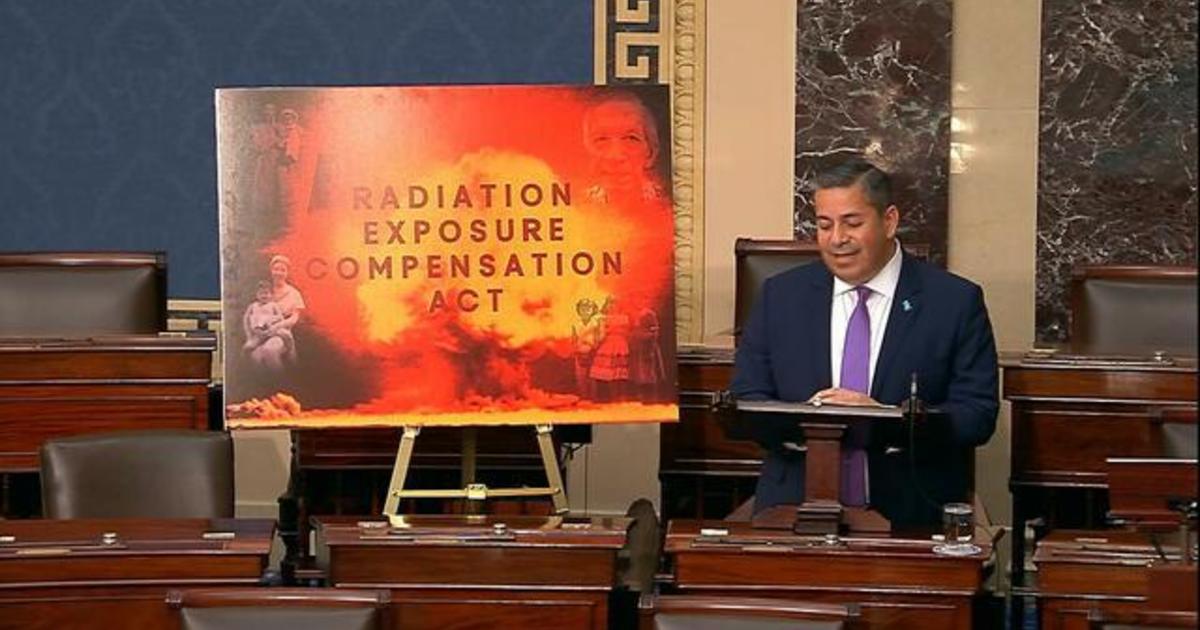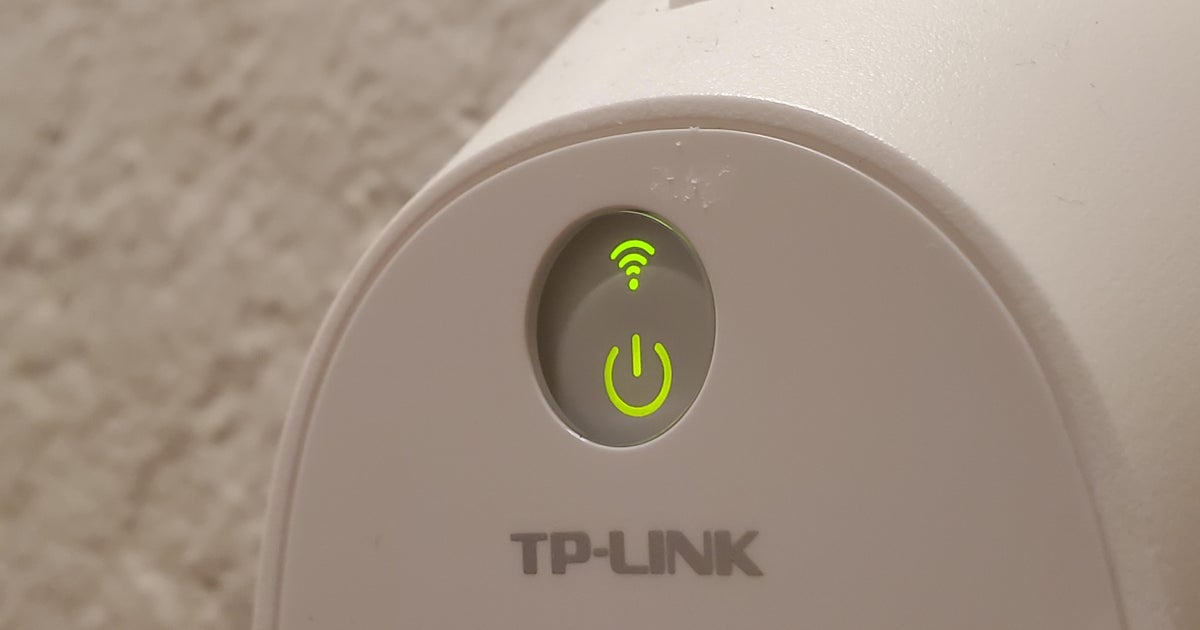CBS News
Renewed push for aid for radiation victims of U.S. nuclear program

With the acclaimed film “Oppenheimer” winning big at the 2024 Oscars, earning awards in major categories such as best director, best actor and best picture, there’s a renewed focus on Capitol Hill on the generations of Americans affected by living near nuclear test sites.
In July 1945, the Trinity test in south-central New Mexico marked the dawn of the nuclear age, a pivotal moment dramatized in “Oppenheimer.”
Not far from the test site, in the desert community of Tularosa, lived the family of Tina Cordova. For generations, Cordova’s family, like others in the area, has battled cancer, a grim legacy of the atomic tests.
Diagnosed with thyroid cancer at 39, Cordova was painfully aware of the connection to the tests. “We don’t ask if we’re going to get cancer,” she said, “we ask when it’s going to be our turn.”
Since 1990, the U.S. government has compensated some families under the Radiation Exposure Compensation Act, paying for medical expenses incurred due to nuclear fallout. However, with the program’s future threatened by budget standoffs, Congress faced a ticking clock to extend its lifeline.
A breakthrough came last Thursday when the Senate approved a plan to fund the program for another five years, significantly expanding its reach to include families like Cordova’s thanks to efforts from New Mexico Sen. Ben Ray Lujan, a Democrat, and Missouri Sen. Josh Hawley, a Republican. This expansion will now cover victims in states such as Idaho, Montana, Guam, Colorado, Tennessee, Kentucky and Alaska, acknowledging the widespread impact of U.S. nuclear activities.
“This is about doing basic justice by the working people of this nation, whom their own government has poisoned,” said Hawley.
Illnesses plague parts of Missouri where World War II–era radioactive waste was processed. Hawley said that St. Louis in particular has seen a “huge” number of cancer cases.
“We are one of the leading sites for breast cancer in the nation, a huge number of childhood cancers and several childhood cancer categories, we lead the nation,” said Hawley
Despite some opposition in Congress, mainly over the financial cost of the legislation, Lujan and Hawley are pressing for approval in the House, leveraging the attention brought by “Oppenheimer” to the early days of the nuclear program.
“Those artists deserve the wins. But what about the people whose stories were not included in that film, who are dying, who are willing to lose all their energy to educate others? I certainly hope that everyone that was a part of ‘Oppenheimer’ doesn’t forget these folks across the country,” said Lujan.
The cost of the legislation is estimated to be in the tens of billions of dollars. Congress has less than three months to formally approve and extend these new benefits, or the money runs out.
The White House has expressed support for the plan, promising the President Biden’s signature if it passes.
CBS News
Social Security benefits could increase for millions of Americans after key Senate vote

Watch CBS News
Be the first to know
Get browser notifications for breaking news, live events, and exclusive reporting.
CBS News
2 Republicans voted to release Ethics Committee’s report on Matt Gaetz misconduct, sources say

Watch CBS News
Be the first to know
Get browser notifications for breaking news, live events, and exclusive reporting.
CBS News
U.S. mulls ban on Chinese-made TP-Link routers over security concerns

The U.S. is considering banning the sale of TP-Link internet routers, which are made in China, over concerns the home devices pose a security risk, the Wall Street Journal reported.
Authorities may ban the popular routers, which were linked to Chinese cyberattacks, as early as next year when President-elect Donald Trump takes office, according to the report.
Trump has signaled that he is prepared to take a tough stance on China in his second term in office, including by introducing levies of as much as 60% on Chinese-made goods.
TP-Link says its routers do not account for a majority of the internet router devices in U.S. homes and small businesses. The routers are available for purchase on Amazon.com, where they are a best-seller. Amazon did not immediately respond to CBS MoneyWatch’s request for comment on the potential ban.
The company’s connectivity products are used by the U.S. Defense Department and other federal government agencies, too, according to the WSJ.
For its part, TP-Link told CBS MoneyWatch that the company’s “security practices are fully in line with industry security standards in the U.S.”
“We implement rigorous secure product development and testing processes, and take timely and appropriate action to mitigate known vulnerabilities,” a TP-Link spokesperson said in a statement to CBS MoneyWatch.
Many consumer brands targeted by Chinese hackers
The company added that many consumer electronics brands are targeted by China-based hacking groups and that it welcomes “opportunities to engage with the federal government to demonstrate that our security practices are fully in line with industry security standards, and to demonstrate our ongoing commitment to the American market, American consumers and addressing U.S. national security risks.”
The Justice Department is investigating whether the routers’ relatively low price violates a law stipulating that companies can’t sell goods for less than the cost of production, the WSJ reported, citing a person familiar with the matter. On Amazon.com, a handful of router models by T-Link are available for sale with a base model costing around $99. The routers are available for sale through a business unit in California as well.
In a statement to CBS MoneyWatch, TP-Link said that while it does undercut competitor prices, it does not sell any products below cost.
Compromised routers
In October, Microsoft published an analysis which found that a Chinese hacking entity had access to a trove of compromised TP-Link routers.
“CovertNetwork-1658 specifically refers to a collection of egress IPs that may be used by one or more Chinese threat actors and is wholly comprised of compromised devices. Microsoft assesses that a threat actor located in China established and maintains this network. The threat actor exploits a vulnerability in the routers to gain remote code execution capability,” the report explains.
TP-Link said that it takes “appropriate action to mitigate any vulnerabilities” the company becomes aware of. It has also signed the U.S. Cybersecurity and Infrastructure Security Agency, or CISA, Secure-by-Design pledge.


